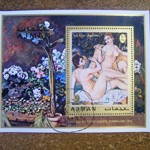FREE: 1901 5¢ Bridge Niagara Falls - US Scott # 297

A member of Listia gave this away for free!
Do you want FREE stuff like this?
Listia is 100% Free to use
Over 100,000 items are FREE on Listia
Declutter your home & save money

"Listia is like EBay, except everything is free" - Los Angeles Times

"An Awesome Way To Give And Get Free Stuff" - Michael Arrington, TechCrunch
This Stuff is Free Too:

FREE

FREE

FREE

FREE

FREE
The listing, 1901 5¢ Bridge Niagara Falls - US Scott # 297 has ended.
U.S. #2971901 5¢ Pan-American Commemorative
Issue Date: May 1, 1901
Quantity issued: 7,201,300
Printed by: Bureau of Engraving and Printing
Method: Flat plate
Watermark: Double line
Perforation: 12
Color: Ultramarine and black
The Pan-American stamps issue is a series of six stamps commemorating a 1901 World’s Fair held at Buffalo, New York. The Pan-American Exposition and World’s Fair was a celebration of technology and its impact on America. The expo was held from May 1 through November 1, 1901. The Pan-American commemoratives salute the marvel of the mechanical age. The stamps are so popular among modern collectors that all six denominations were selected to be included in 100 Greatest American Stamps – and each ranked in the top 50.
The 5¢ denomination pictures the legendary Honeymoon Bridge at Niagara Falls. At the time this photograph was taken, this was the largest single-span bridge in the entire world. Niagara Falls is shown in the background, and the Canadian and American shores appear on either side. At the time, no one could have foreseen the dramatic demise of the bridge.
The Niagara River tumbles over a series of massive waterfalls at the rate of six million cubic feet of water per minute, making it the most powerful waterfall in North America. The Honeymoon Bridge was built 500 feet north of the American Falls. The two-hinged steel arch featured a latticed rib and an 840-foot span that reached across the gorge to the top of the shorelines. It was later dismantled and moved up the river to Queenston, Ontario.
Arctic winters turn the fall’s spray and mist to spectacular ice formations. A huge ice bridge rising up to 80 feet in the air formed around the abutments of the Honeymoon Bridge. In 1899, pressure from the ice caused several steel pieces to bend. The ice was blasted away, and protective walls were built to shield the abutments from the annual onslaught of ice.
1901 5¢ Bridge Niagara Falls - US Scott # 297 is in the Collectibles | Stamps category

